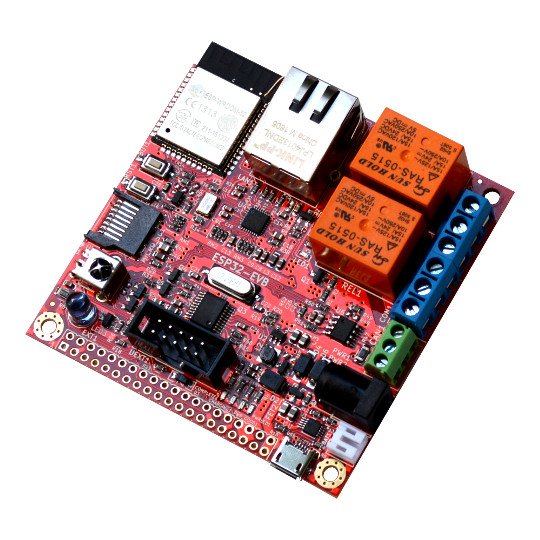Olimex ESP32-EVB
Overview
The Olimex ESP32-EVB is an OSHW certified, open-source IoT board based on the Espressif ESP32-WROOM-32E/UE module. It has a wired 100Mbit/s Ethernet Interface, Bluetooth LE, WiFi, infrared remote control, and CAN connectivity. Two relays allows switching power appliances on and off.
The board can operate from a single LiPo backup battery as it has an internal LiPo battery charger. There is no step-up converter, so relays, CAN, and USB power does not work when running off battery.

Fig. 204 ESP32-EVB (Credit: Olimex)
Hardware
ESP32-WROOM-32E/UE module with 4MB flash.
On-board programmer, CH340T USB-to-UART
WiFi, Bluetooth LE connectivity.
100Mbit/s Ethernet interface, Microchip LAN8710A PHY.
MicroSD card slot.
2 x 10A/250VAC (15A/120VAC 15A/24VDC) relays with connectors and status LEDs.
CAN interface, Microchip MCP2562-E high-speed CAN transceiver.
IR receiver and transmitter, up to 5 meters distance.
BL4054B LiPo battery charger with status LEDs for stand-alone operation during power outages.
Power jack for external 5VDC power supply.
Univeral EXTension (UEXT) connector for connecting UEXT modules.
User push button.
40 pin GPIO connector with all ESP32 pins.
For more information about the ESP32-EVB and the ESP32-WROOM-32E/UE module, see these reference documents:
Supported Features
The olimex_esp32_evb board configuration supports the following hardware features:
Interface |
Controller |
Driver/Component |
|---|---|---|
EFUSE |
on-chip |
hwinfo, device ID |
FLASH |
module |
External flash |
GPIO |
on-chip |
gpio |
I2C |
on-chip |
I2C |
INTERRUPT |
on-chip |
interrupt controller |
IO_MUX |
on-chip |
pinctrl |
SPI |
on-chip |
spi |
TIMG |
on-chip |
counter |
TRNG |
on-chip |
entropy |
TWAI |
on-chip |
CAN controller |
UART |
on-chip |
uart |
WDT |
on-chip |
watchdog |
WiFi |
on-chip |
WiFi |
The default configuration can be found in the defconfig file:
boards/xtensa/olimex_esp32_evb/olimex_esp32_evb_defconfig.
Other hardware features are not currently supported by the port.
System requirements
Prerequisites
Espressif HAL requires binary blobs in order work. The west extension below performs the required syncronization to clone, checkout and pull the submodules:
west espressif update
Note
It is recommended running the command above after west update.
Building & Flashing
Build and flash applications as usual (see Building an Application and Run an Application for more details).
# From the root of the zephyr repository
west build -b olimex_esp32_evb samples/hello_world
The usual flash target will work with the olimex_esp32_evb board
configuration. Here is an example for the Hello World
application.
# From the root of the zephyr repository
west build -b olimex_esp32_evb samples/hello_world
west flash
Open the serial monitor using the following command:
west espressif monitor
After the board has automatically reset and booted, you should see the following message in the monitor:
***** Booting Zephyr OS vx.x.x-xxx-gxxxxxxxxxxxx *****
Hello World! olimex_esp32_evb
Debugging
As with much custom hardware, the ESP32 modules require patches to OpenOCD that are not upstreamed. Espressif maintains their own fork of the project. The custom OpenOCD can be obtained by running the following extension:
west espressif install
Note
By default, the OpenOCD will be downloaded and installed under $HOME/.espressif/tools/zephyr directory (%USERPROFILE%/.espressif/tools/zephyr on Windows).
The Zephyr SDK uses a bundled version of OpenOCD by default. You can overwrite that behavior by adding the
-DOPENOCD=<path/to/bin/openocd> -DOPENOCD_DEFAULT_PATH=<path/to/openocd/share/openocd/scripts>
parameter when building.
Here is an example for building the Hello World application.
# From the root of the zephyr repository
west build -b olimex_esp32_evb samples/hello_world -- -DOPENOCD=<path/to/bin/openocd> -DOPENOCD_DEFAULT_PATH=<path/to/openocd/share/openocd/scripts>
west flash
You can debug an application in the usual way. Here is an example for the Hello World application.
# From the root of the zephyr repository
west build -b olimex_esp32_evb samples/hello_world
west debug
